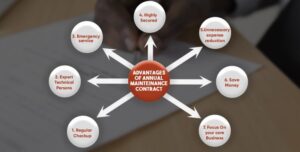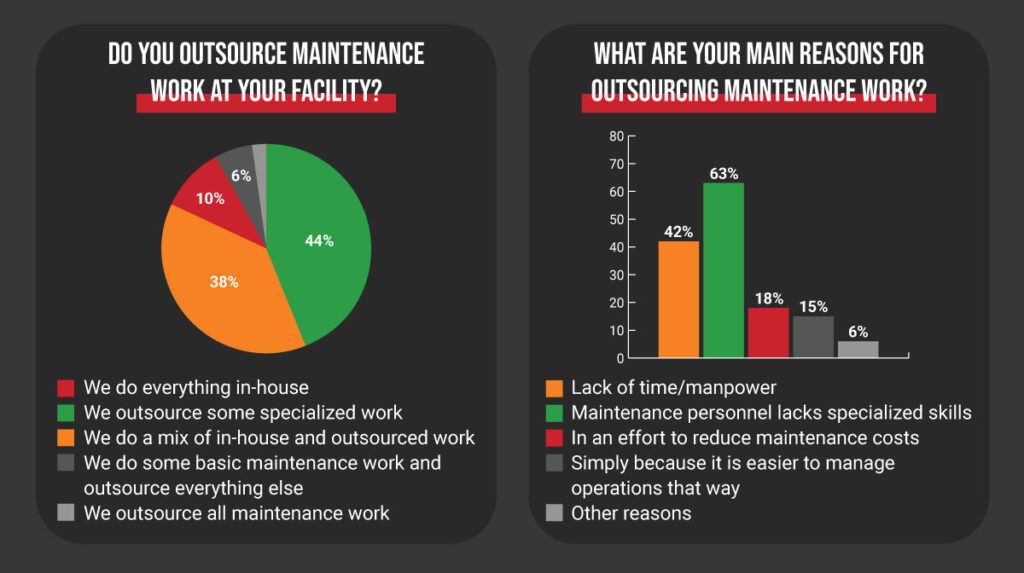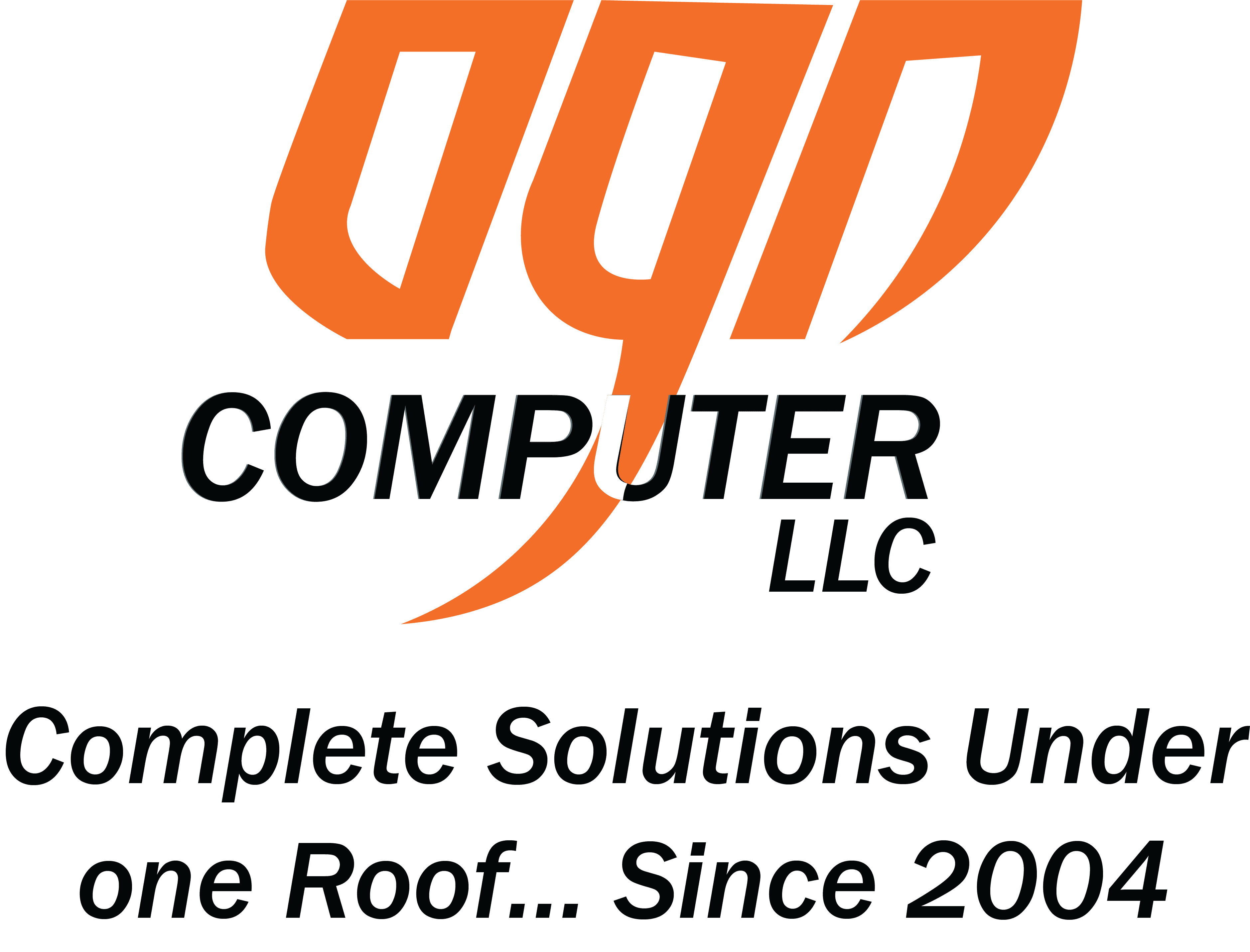
Benefits Annual Maintenance Contract for IT Services
An AMC ensures regular and proactive maintenance of your IT infrastructure. This includes hardware, software, and network components. Regular check-ups and updates help prevent unexpected breakdowns and downtime.
Why Choose AGN FOR ANNUAL MAINTENANCE
دعم 24/7
يمكن الوصول إليها باستمرار: احصل على المساعدة في أي وقت تحتاج إليها، سبعة أيام في الأسبوع، 24 ساعة في اليوم.
المساعدة الفورية: مساعدة سريعة ومتقبلة لحل المشكلات على الفور.
راحة البال: استمتع بمعرفة أن المساعدة لا تستغرق سوى مكالمة هاتفية، مما يضمن استمرار العمليات.
IT Solutions With On Site Suppport
On-site team: Being available to client physically at their site is an added help.
Preventive remedies identify possible problems before they arise.
التحسين المستمر:التحسين المستمر: Continually improving tactics to remain one step ahead of obstacles.
نصيحة الخبراء
رؤى أساسية: الاستفادة من المشورة والخبرة المهنية.
اقتراحات مستنيرة: احصل على اقتراحات مستنيرة مستمدة من ثروة من الخبرة.
حلول مخصصة: specialised solutions designed to meet your unique requirements.

Highly Secured
Implementing robust measures and protocols to protect IT systems, data, and networks from unauthorized access

Regular Checkup
Routine IT maintenance, are essential for ensuring the reliability, performance, and security of IT systems and IT infrastructure.

Expert Techincal Person
IT Services in Dubai Expert IT perso who provide advanced technical support, consulting, and solutions.

Emergency Services
Disaster and recovery solutions are the basics of Information technology solutions and services

Save Money Through IT AMC
Get the best ROI on your IT infrastrcuture spent by getting right IT solutions company.

Focus on your Core Business
Focus on CORE business is essential and it can only be acheived when you have right team in place.
Benefits Annual Maintenance Contract for IT Services
An Annual Maintenance Contract (AMC) for IT services offers several benefits to businesses and individuals who rely on technology for their daily operations. Here are some key advantages: Cost Predictabilit,Proactive Maintenance,Reduced Downtime,Extended Equipment Life,Timely Software Updates,Expert Technical Support,Priority Service,Customization,Remote Monitoring,Enhanced Security,Compliance Assurance,Peace of Mind,Improved Productivity,Asset Management,Vendor Relationships
Cost Predictability: AMCs typically involve a fixed, annual fee, making it easier to budget for IT expenses. This predictability helps businesses manage their finances more effectively.
Proactive Maintenance: Regular maintenance and check-ups are part of the AMC, which helps prevent unexpected breakdowns and downtime. This proactive approach minimizes disruptions to business operations.
Reduced Downtime: With proactive maintenance, the likelihood of system failures or issues is reduced. This results in less downtime, ensuring that IT services remain available and productive.
Extended Equipment Life: Proper and timely maintenance can extend the lifespan of IT equipment, reducing the need for frequent replacements and lowering the total cost of ownership.
Timely Software Updates: AMCs often include software updates and patches, keeping systems secure and up-to-date. This helps protect against vulnerabilities and cyber threats.
Expert Technical Support: AMCs provide access to skilled IT professionals who can quickly address issues and provide technical support. This can be especially valuable for businesses with limited in-house IT expertise.
Priority Service: Many AMC agreements come with priority service, ensuring that your IT issues are addressed promptly and efficiently, minimizing disruptions to your business.
8. Customization: AMCs can be tailored to suit your specific IT needs and budget. You can choose the level of service and support that aligns with your requirements.
9. Remote Monitoring: Some AMCs include remote monitoring of your IT systems, allowing technicians to detect and resolve problems before they escalate into major issues.

10. Enhanced Security: Regular security checks and updates included in the AMC help protect your IT infrastructure from cyber threats, safeguarding sensitive data and information.
11. Compliance Assurance: For businesses in regulated industries, AMCs can help ensure that your IT systems remain compliant with industry-specific regulations and standards.
12. Peace of Mind: Knowing that your IT infrastructure is in the hands of experts and that potential issues are being proactively managed can provide peace of mind, allowing you to focus on your core business activities.
12. Improved Productivity: With fewer IT disruptions and faster issue resolution, employees can work more productively, leading to improved overall business performance.
14. Asset Management: AMCs often include asset tracking and management services, helping organizations keep an accurate inventory of their IT assets.
15. Vendor Relationships: IT service providers often have strong relationships with technology vendors, which can lead to better pricing on hardware and software purchases.
In summary, an Annual Maintenance Contract for IT services offers a range of benefits, including cost savings, reduced downtime, enhanced security, access to expert support, and the peace of mind that comes with knowing your IT infrastructure is being proactively managed and maintained. It’s a proactive approach to IT management that can contribute significantly to the efficiency and success of your business or personal computing environment.
High-security IT refers to the practice of implementing robust measures and protocols to protect information technology systems, data, and networks from unauthorized access, data breaches, cyberattacks, and other security threats. This level of security is particularly essential for organizations and industries that handle sensitive and confidential information, such as government agencies, financial institutions, healthcare providers, and corporations. Here are key aspects and considerations related to high-security IT,
Regular checkup IT services, often referred to as routine or scheduled IT maintenance, are essential for ensuring the reliability, performance, and security of information technology systems and infrastructure. These services involve periodic inspections, updates, and optimizations to prevent potential issues, enhance efficiency, and minimize downtime. Here are some key aspects of regular checkup IT services:
Hardware Inspection: Periodic checks of hardware components such as servers, workstations, laptops, switches, routers, and other devices are conducted to identify signs of wear, damage, or impending failures. This helps in timely hardware replacement or repairs.
Software Updates: Regular software updates, including operating systems, applications, and security patches, are applied to keep systems up-to-date and protected against known vulnerabilities.
Virus and Malware Scans: Scanning for viruses, malware, and other security threats is a routine task to ensure the integrity of the IT environment. Regular updates to antivirus and antimalware definitions are crucial.
Data Backups: Scheduled backups of critical data are performed to safeguard against data loss due to hardware failures, accidental deletions, or cyberattacks. Regular testing of backup restorations is also important.
Network Performance Monitoring: Continuous monitoring of network traffic and performance metrics helps identify bottlenecks, congestion, or abnormal activity. This data is used to optimize network performance.
Security Auditing: Regular security audits and vulnerability assessments are conducted to identify and rectify potential weaknesses in the IT infrastructure before they can be exploited by cyber threats.
User Account Management: Managing user accounts, permissions, and access privileges is essential to ensure that only authorized individuals have access to sensitive information and systems.
Password Policy Enforcement: Ensuring that strong password policies are enforced and periodically requiring password changes can enhance security by preventing unauthorized access.
Email and Communication Systems: Routine checks and maintenance of email servers, communication platforms, and collaboration tools help prevent service disruptions and protect against email-related threats.
Hardware and Software Inventory: Maintaining an up-to-date inventory of all hardware and software assets helps with license management, budgeting, and ensuring compliance with software usage agreements.
Documentation: Keeping documentation up-to-date, including network diagrams, configurations, and incident reports, is crucial for troubleshooting and maintaining the IT environment efficiently.
Performance Tuning: Optimization of system configurations, network settings, and application parameters is performed to improve overall IT system performance.
Disaster Recovery Testing: Periodic testing of disaster recovery plans and procedures ensures that the organization can quickly recover from IT disruptions or catastrophic events.
End-User Support: Providing ongoing technical support to end-users, addressing their IT-related issues, and offering training when necessary helps maintain a smooth IT experience.
Compliance Checks: Ensuring that IT systems and practices comply with industry-specific regulations and standards is vital for legal and security reasons.
Regular checkup IT services are instrumental in preventing IT-related problems, improving system reliability, and mitigating security risks. By proactively addressing issues before they escalate, organizations can reduce downtime, enhance productivity, and protect sensitive data.
Saving money through an IT Annual Maintenance Contract (AMC) involves optimizing IT expenses while ensuring the reliability and performance of your technology infrastructure. Here are some ways to save money while benefiting from an IT AMC:
1. Predictable Costs: An IT AMC typically involves a fixed annual fee, allowing you to budget more effectively. This predictability helps prevent unexpected and costly IT expenditures.
2. Preventive Maintenance: Regular maintenance included in the AMC helps prevent unexpected breakdowns and costly repairs. Addressing issues before they escalate can save significant money in the long run.
3. Extended Equipment Life: Proper maintenance can extend the lifespan of your IT hardware. This reduces the need for frequent replacements, saving on capital expenses.
4. Software Updates: AMC often includes software updates and patches. Staying up-to-date can prevent security breaches and data loss, potentially saving you from costly data recovery and legal expenses.
5. Remote Support: Many AMCs offer remote IT support. This can be more cost-effective than on-site support because it reduces travel and response time, saving both time and money.
6. Priority Service: AMC agreements often come with priority service. This means that your IT issues are addressed more quickly, reducing downtime and its associated costs.
7. Reduced Downtime: By addressing issues proactively, AMCs minimize system downtime. For businesses, every minute of downtime can result in lost revenue, making this a significant cost-saving factor.
8. Tailored Services: Customize your AMC to meet your specific needs. Only pay for the services that are essential for your organization, avoiding unnecessary expenses.
9. Consolidation: Consider bundling multiple IT services into a single AMC. This can be more cost-effective than managing various service contracts separately.
10. Vendor Relationships: Leverage your IT service provider’s relationships with hardware and software vendors. They may be able to negotiate better prices on your behalf.
11. Energy Efficiency: AMC can include monitoring and optimization of energy consumption in your IT infrastructure. Reducing energy usage not only saves money but also benefits the environment.
12. قابلية التوسع As your business grows or changes, you can adjust the terms of your AMC to accommodate your evolving IT needs. This flexibility can save you from overpaying for services you no longer require.
13. Compliance Assurance: Ensure that your IT systems comply with industry-specific regulations and standards. Avoiding non-compliance fines and penalties can be a significant cost-saving measure.
14. Risk Mitigation: Regular security updates and monitoring included in the AMC help protect your data from cyber threats. Avoiding data breaches and their associated costs is crucial.
15. Employee Productivity: Reliable IT services provided through an AMC enable employees to work efficiently. Improved productivity can translate into cost savings.
16. Asset Management: AMCs often include asset management services, helping you track and manage IT assets more effectively, which can prevent unnecessary purchases.

An expert technical person in IT services is a highly skilled professional who specializes in various aspects of information technology (IT) to provide advanced technical support, consulting, and solutions. These individuals possess in-depth knowledge and experience in a wide range of IT domains and are often sought after for their expertise. Here are some key attributes and roles associated with an expert technical person in IT services:
Technical Proficiency: An expert in IT services has a deep and up-to-date understanding of IT technologies, including hardware, software, networking, cloud computing, cybersecurity, and more.
Problem Solver: They excel at troubleshooting complex technical issues, identifying root causes, and implementing effective solutions in a timely manner.
Consultant: Expert technical persons often serve as consultants, advising organizations on IT strategy, infrastructure design, technology adoption, and best practices.
Project Management: They may lead or contribute to IT projects, overseeing project planning, execution, and delivery to ensure successful outcomes.
Cybersecurity Expertise: In an era of increasing cyber threats, they are well-versed in cybersecurity measures, helping organizations protect their data and systems from attacks.
Network Administration: They have the skills to design, configure, and maintain robust network infrastructures, ensuring reliable connectivity and performance.
Software Development: Some experts may have programming and development expertise, allowing them to create custom software solutions tailored to specific business needs.
Cloud Computing: They understand cloud platforms and services, helping organizations migrate to the cloud, optimize cloud resources, and ensure data security in the cloud environment.
Data Management: Proficiency in data storage, databases, and data analytics is common among IT experts, enabling them to manage and analyze data effectively.
Virtualization: They are familiar with virtualization technologies, such as virtual machines (VMs) and containers, to optimize hardware resources and improve scalability.
Server Administration: Expert technical persons can manage servers, including configuration, maintenance, and troubleshooting, to ensure server reliability.
IT Policy and Compliance: They are knowledgeable about IT policies, regulations, and compliance standards, ensuring that organizations adhere to legal and industry-specific requirements.
Continuous Learning: Staying up-to-date with the latest IT trends, technologies, and certifications is a hallmark of an expert in IT services.
Vendor and Tool Evaluation: They evaluate and select IT vendors, hardware, software, and tools that align with an organization’s needs and budget.
Communication Skills: Effective communication is essential, as experts often need to convey technical information to non-technical stakeholders and collaborate with diverse teams.
Leadership: In some cases, they may hold leadership roles, overseeing IT departments, teams, or projects.
Training and Knowledge Sharing: They may provide training and knowledge-sharing sessions to empower IT staff and end-users to handle common IT issues and adopt best practices.
An expert technical person in IT services plays a crucial role in maintaining the integrity and functionality of an organization’s IT infrastructure. Their expertise ensures that technology serves as an enabler for business growth and innovation while mitigating potential risks and challenges.
Emergency services in IT refer to the specialized procedures, resources, and personnel dedicated to handling critical and time-sensitive IT issues, disruptions, or crises. These services are essential to minimize downtime, restore functionality, and mitigate the impact of unexpected events on an organization’s information technology infrastructure. Here are key aspects of emergency services in IT:
1. Incident Response: IT emergency services encompass incident response plans and teams that are ready to address various types of incidents, such as cyberattacks, system failures, data breaches, and natural disasters.
2. 24/7 Availability: IT emergency services typically operate around the clock, ensuring that technical support and assistance are available at any time, including nights, weekends, and holidays.
3. Dedicated Hotlines: Organizations often establish dedicated emergency hotlines or communication channels to report and escalate IT incidents quickly.
4. Rapid Incident Assessment: Upon notification of an IT emergency, expert technicians promptly assess the situation to understand the severity and scope of the issue.
5. Priority Handling: Emergency incidents receive top priority, and resources are allocated accordingly to resolve the issue as quickly as possible.
6. Technical Expertise: IT emergency teams consist of highly skilled professionals who specialize in various IT domains, such as cybersecurity, network engineering, database management, and system administration.
7. Communication and Coordination: Effective communication and coordination among team members and relevant stakeholders are critical to ensure a swift and efficient response.
8. Containment and Mitigation: IT emergency services work to contain the incident, prevent it from spreading further, and implement immediate mitigation measures to limit damage.
9. Data Recovery: In the event of data loss or corruption, emergency services prioritize data recovery efforts to minimize data loss and restore critical information.
10. System Restoration: Experts focus on restoring affected systems and services to normal operation, minimizing disruption to business operations.
11. Forensic Analysis: In cases of security incidents, forensic analysis may be conducted to determine the extent of the breach, identify vulnerabilities, and gather evidence for investigation.
12. Business Continuity Planning: IT emergency services often collaborate with business continuity teams to ensure that essential functions can continue during and after an IT crisis.
13. Documentation and Reporting: Comprehensive documentation of incident details, actions taken, and lessons learned is critical for post-incident analysis and improvement of incident response procedures.
14. Training and Preparedness: Regular training and drills are conducted to ensure that IT emergency teams are well-prepared to respond effectively to a wide range of scenarios.
15. Regulatory Compliance: Emergency services may need to ensure compliance with data protection regulations and industry-specific requirements during incident response.
16. Public Relations: Depending on the nature of the incident, communication with the public, customers, and partners may be necessary to maintain trust and transparency.
17. Post-Incident Review: After resolving the emergency, a post-incident review is conducted to evaluate the response, identify areas for improvement, and update incident response plans accordingly.
IT emergency services are an integral part of modern organizations, helping to safeguard critical IT assets and maintain business continuity in the face of unexpected challenges. These services require careful planning, dedicated resources, and a commitment to rapid and effective response.
Benefits of an Annual Maintenance Contract for IT Services OutSourcing
Cost Savings Solutions
Outsourcing an AMC often proves more cost-effective than hiring and maintaining an in-house IT team. You can avoid expenses related to salaries, benefits, training, and equipment for IT staff
Expertise Access
IT service providers specialize in various IT domains and bring a wealth of expertise to the table. By outsourcing, you gain access to a team of highly skilled professionals who can efficiently manage your IT infrastructure
Proactive Maintenance
Outsourcing AMCs ensures that your IT systems receive regular and proactive maintenance. This helps prevent unexpected breakdowns and costly downtime, ultimately saving you money.
Resource Allocation
Outsourcing allows you to allocate fewer internal resources and less time to IT-related tasks. Your employees can concentrate on their primary roles and core business functions, improving overall productivity.
أسئلة مكررة
These are most commonly ask questions by our clients.
All businesses require scalability, flexibility, and cost-effectiveness and here cloud technology offers all of them.
By using cloud base solution one can save on cost of data backup, computational power, and hi-performance hardware.
Points given above in this blog are very helpful to start with. Incase you need to shortlist or select right package for your business feel free to contact +971585815887
